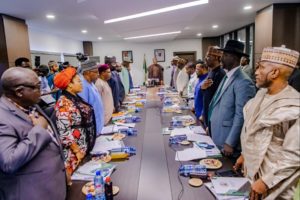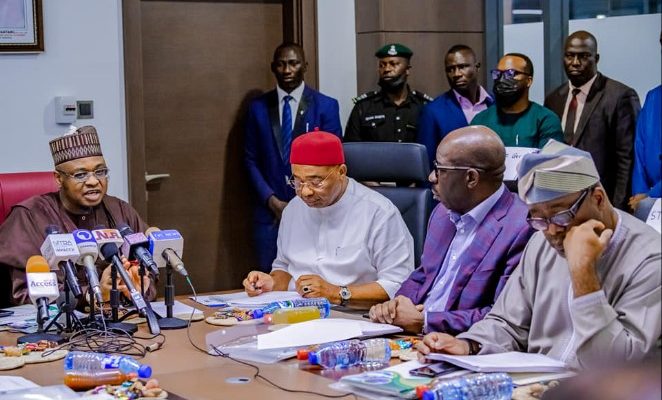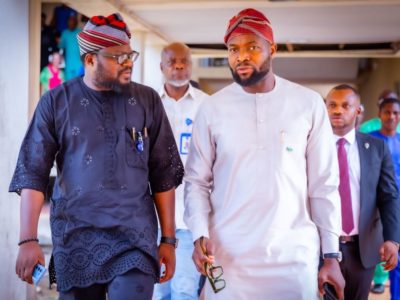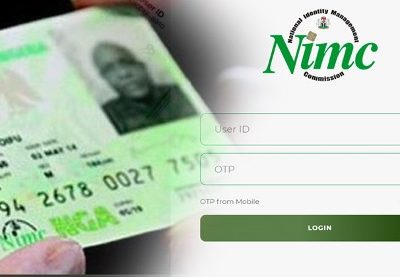The Nigerian government has said its agenda for digital economy is only sustainable through an all-inclusive approach in the implementation of the National Digital Economy Policy and Strategy (NDEPS) for a Digital Nigeria.
The Federal Government made this assertion at an inaugural meeting of the Presidential Council on Digital Economy & eGovernment Master Plan consisting of high-profile representatives from the government, industry, academia and other professional bodies.
RELATED: Nigeria firms up on digital economy as Pantami inaugurates committee to review NDEPS
The Minister of Communications and Digital Economy Prof Isa Ali Ibrahim Pantami who chaired the meeting on behalf of President Muhammadu Buhari said the eight pillars of the NDEPS are clear definers of government’s roadmap for digital economy; adding that its implementation would consolidate the gains recorded so far and boost the growth of the digital economy sector.

Members of the Presidential Council on Digital Economy & eGovernment Master Plan
His words: On the 28th of November, 2019, the President personally launched and unveiled the Nigerian National Digital Economy Policy and Strategy (NDEPS) for a Digital Nigeria 2020-2030. In addition, on the 19th of May, 2020, Mr. President also launched and unveiled Nigerian National Broadband Plan 2020-2025″.

Pantami with Governor Godwin Obaseki of Edo state and Governor Hope Uzodinma of Imo state
“In all these policies that President Muhammadu Buhari has launched and unveiled, he made it very clear one of the priority areas of this administration is economic development, particularly digital economy, in order to diversify the major sources of revenue for government.”
He said Nigeria’s digital journey has been highly commendable across board, given the unprecedented contributions and impact the sector has had on the nation’s gross domestic product GDP.
“Despite our modest achievements and gains, challenges are inevitable from time to time. So, this document is not only a Federal Policy but also a National one which implies that other tiers of government have a strong role to play, particularly the governors as well as institutions under their leadership towards addressing those challenges for good”, the minister stressed while acknowledging the thoughtfulness of President Muhammadu Buhari in the selection of one governor from each geopolitical zone to represent the entirety of Nigerians.
The aim of the “strategic composition and adoption of the triple helix model of innovation is to ensure that any policy or decision to be taken at the Federal level would be accepted and implemented by states, the minister said.
Adding: “The Governors of Edo State, Imo, Lagos, Nasarawa, Kaduna, and Gombe were selected by President Buhari to represent the South-South, South-East, South-West, North-Central, North-West and North-East respectively.
“Mr. President has also appointed two Vice-Chancellors to represent the academia in the Council; including that of Ahmadu Bello University and the Federal University of Technology, Owerri. The industry is so fully represented.
“The policy is the global best practice because no country’s digital economy can be implemented without bringing key institutions of government, particularly sub-nationals and states as most of the decision cannot be implemented by the government alone.”
He maintained that: “Although the implementation of the policy kick-started immediately after it was launched; looking at the baseline we had established then, and what we have achieved so far, there Isa gainsaying the fact that it is indeed commendable because it is within this period that the ICT sector contributed 17.92% to the GDP.
“Within this period also we trained over five hundred thousand Nigerians and signed partnerships with tech giants where one of them supported our youths by training a minimum of Five Million as part of their Corporate Social Responsibility. We have even signed another partnership with one of the tech giants where they will establish about three hundred ICT academies in Nigeria to up the digital skills of our citizens.”
The minister said the Federal Executive Council (FEC) had approved the National e-Governance Master Plan with a role for sub-nationals.
The minister also revealed that “recently, we signed an MoU with the Korean Government where they intend to support Nigerian Government towards the implementation of the Plan with a minimum of Thirteen Million Dollar and this has already been signed.”
While briefing members on the Council’s Terms of Reference (ToR), the Director General of the National Information Technology Development Agency (NITDA), Kashifu Inuwa Abdullahi, who is also the secretary to the council, enumerated seven areas and concerns.
He expressed the proposed implementation strategies while submitting two prayers for consideration by the council.
“For the Council to ratify the ToR and for the chair to create a sub-committee to handle each of the thematic areas as well as come up with implementation plan.”
The Council, inaugurated in June by President Buhari, is the highest body to provide strategic directions for e-Governance and digital economy in Nigeria.































